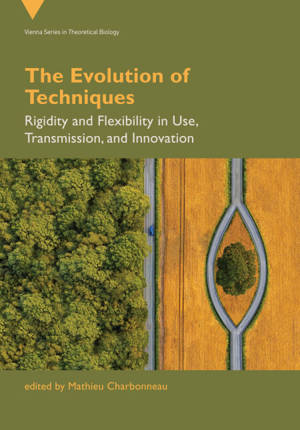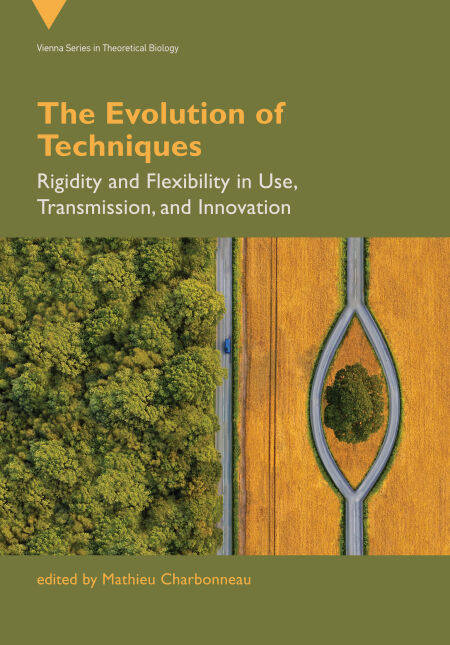
- Retrait gratuit dans votre magasin Club
- 7.000.000 titres dans notre catalogue
- Payer en toute sécurité
- Toujours un magasin près de chez vous
- Retrait gratuit dans votre magasin Club
- 7.000.0000 titres dans notre catalogue
- Payer en toute sécurité
- Toujours un magasin près de chez vous
The Evolution of Techniques EBOOK
Rigidity and Flexibility in Use, Transmission, and Innovation
64,07 €
+ 64 points
Description
A novel, interdisciplinary exploration of the relative contributions of rigidity and flexibility in the adoption, maintenance, and evolution of technical traditions.
Techniques can either be used in rigid, stereotypical ways or in flexibly adaptive ways, or in some combination of the two. The Evolution of Techniques, edited by Mathieu Charbonneau, addresses the impacts of both flexibility and rigidity on how techniques are used, transformed, and reconstructed, at varying social and temporal scales. The multidisciplinary contributors demonstrate the important role of the varied learning contexts and social configurations involved in the transmission, use, and evolution of techniques. They explore the diversity of cognitive, behavioral, sociocultural, and ecological mechanisms that promote and constrain technical flexibility and rigidity, proposing a deeper picture of the enablers of, and obstacles to, technical transmission and change.
In line with the extended evolutionary synthesis, the book proposes a more inclusive and materially grounded conception of technical evolution in terms of promiscuous, dynamic, and multidirectional causal processes. Offering new evidence and novel theoretical perspectives, the contributors deploy a diversity of methods, including ethnographies, field and laboratory experiments, cladistics and phylogenetic tree building, historiography, and philosophical analysis. Examples of the wide range of topics covered include field experiments with potters from five cultures, stability and change in Paleolithic toolmaking, why children lack flexibility when making tools, and cultural techniques in nonhuman animals.
The volume’s three thematic sections are:
· Timescales of technical rigidity and flexibility
· Rigid copying to flexible reconstruction
· Exogenous factors of technical rigidity and flexibility
The volume closes with a discussion by philosopher Kim Sterelny.
Contributors
Rita Astuti, Adam Howell Boyette, Blandine Bril, Josep Call, Mathieu Charbonneau, Arianna Curioni, Nicola Cutting, Bert De Munck, György Gergely, Anne-Lise Goujon, Ildikó Király, Catherine Lara, Sébastien Manem, Luke McEllin, Helena Miton, Giulio Ongaro, Sarah Pope-Caldwell, Valentine Roux, Manon Schweinfurth, Dan Sperber, Kim Sterelny, Dietrich Stout, James W. A. Strachan, Sadie Tenpas
Techniques can either be used in rigid, stereotypical ways or in flexibly adaptive ways, or in some combination of the two. The Evolution of Techniques, edited by Mathieu Charbonneau, addresses the impacts of both flexibility and rigidity on how techniques are used, transformed, and reconstructed, at varying social and temporal scales. The multidisciplinary contributors demonstrate the important role of the varied learning contexts and social configurations involved in the transmission, use, and evolution of techniques. They explore the diversity of cognitive, behavioral, sociocultural, and ecological mechanisms that promote and constrain technical flexibility and rigidity, proposing a deeper picture of the enablers of, and obstacles to, technical transmission and change.
In line with the extended evolutionary synthesis, the book proposes a more inclusive and materially grounded conception of technical evolution in terms of promiscuous, dynamic, and multidirectional causal processes. Offering new evidence and novel theoretical perspectives, the contributors deploy a diversity of methods, including ethnographies, field and laboratory experiments, cladistics and phylogenetic tree building, historiography, and philosophical analysis. Examples of the wide range of topics covered include field experiments with potters from five cultures, stability and change in Paleolithic toolmaking, why children lack flexibility when making tools, and cultural techniques in nonhuman animals.
The volume’s three thematic sections are:
· Timescales of technical rigidity and flexibility
· Rigid copying to flexible reconstruction
· Exogenous factors of technical rigidity and flexibility
The volume closes with a discussion by philosopher Kim Sterelny.
Contributors
Rita Astuti, Adam Howell Boyette, Blandine Bril, Josep Call, Mathieu Charbonneau, Arianna Curioni, Nicola Cutting, Bert De Munck, György Gergely, Anne-Lise Goujon, Ildikó Király, Catherine Lara, Sébastien Manem, Luke McEllin, Helena Miton, Giulio Ongaro, Sarah Pope-Caldwell, Valentine Roux, Manon Schweinfurth, Dan Sperber, Kim Sterelny, Dietrich Stout, James W. A. Strachan, Sadie Tenpas
Spécifications
Parties prenantes
- Editeur:
Contenu
- Nombre de pages :
- 308
- Langue:
- Anglais
- Collection :
Caractéristiques
- EAN:
- 9780262378383
- Date de parution :
- 25-03-24
- Format:
- Ebook
- Protection digitale:
- Adobe DRM
- Format numérique:
- ePub

Les avis
Nous publions uniquement les avis qui respectent les conditions requises. Consultez nos conditions pour les avis.





